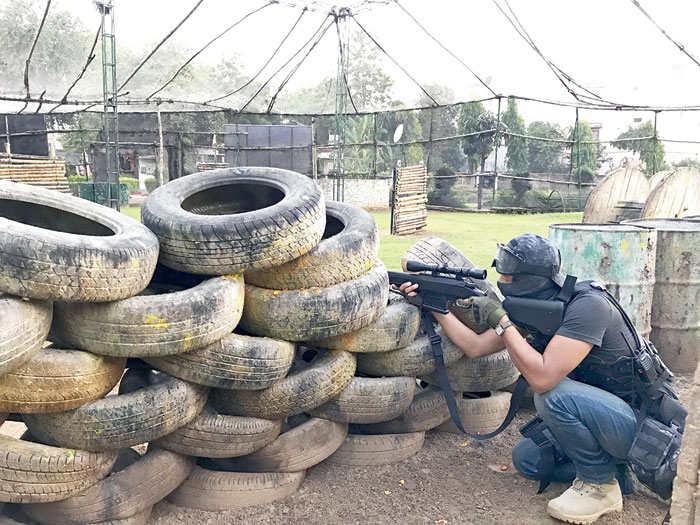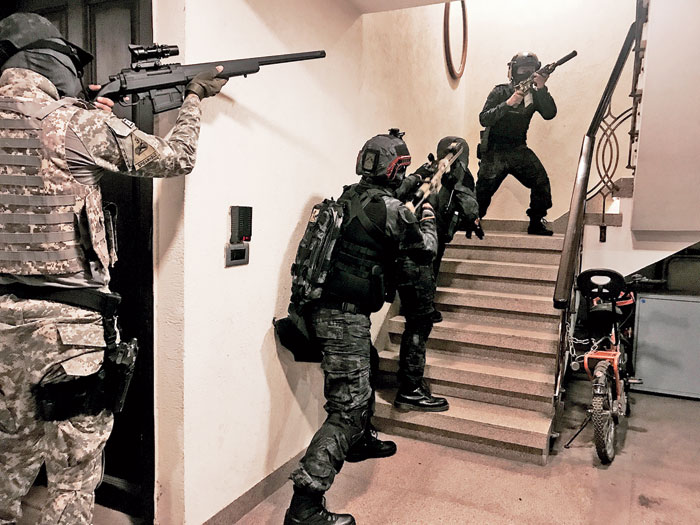Almost 80 per cent of Aishwarya Gupta’s business comes from the Northeast, especially Nagaland, Manipur and Sikkim. The 31-year-old imports airsoft guns and equipment. He is also the founder of Airsoft Barrack — an e-commerce site that retails airsoft equipment.
Airsoft is a game wherein participants tag opponents by hitting them with very small, lightweight plastic balls launched from a compressed-air powered gun. It falls under MilSim or military simulation and refers to armed confrontation scenarios conducted by civilians for entertainment purposes.
Keisham Rohan is a 21-year-old from Manipur who has always been fascinated by war games, action movies and guns. Last year, Rohan met Gupta, who is based in Calcutta, through an online community for airsoft enthusiasts in India. Says Rohan, “I recently purchased an airsoft gun with his help. It cost me around Rs 35,000 with duty. He is now helping me buy another one.” The guns Gupta sells range from Rs 3,000 to Rs 35,000. But those passionate about the sport are ready to spend even a couple of lakhs on a single purchase.
Airsoft has its roots in the late 1980s. In countries such as Japan — where firearms were difficult or impossible to obtain due to local laws — people sought a legal alternative. Originally designed for target shooting, the game eventually became popular for casual war games. Even though airsoft equipment was designed to closely emulate real guns, it is harmless in nature. Nevertheless, in many countries the use of airsoft in public is not legal because of the resemblance to actual firearms.

A paintball session Picture source: Aishwarya Gupta
In India, airsoft is an unrecognised sporting activity. And since there are no manufacturers of airsoft guns in the country, it is difficult to find and buy these.
Gupta was seven when he saw a real pistol for the first time in his grandfather’s drawer. The family, originally hailing from Haryana, has a tradition of worshipping weapons. Come Dussehra, revolvers, double barrels, pistols, everything comes out of the closets. He tells The Telegraph, “I can’t even explain what it feels like to hold a gun. It is exhilarating. It has an inexplicable charm.” And what does he like most about it? “The aesthetics,” comes the reply.
Sometime in July last year, after an Internet search and inspired by the Hindi Web series, Mirzapur, Gupta decided to order a gun for himself from Japan or Germany. He says, “When I understood that I can’t get real guns here without a licence, airsoft guns intrigued me.” His first imported airsoft gun was a semi-automatic pistol called Tokyo Marui m9a1. It cost him Rs 8,000. After using the gun for 10-15 days, he decided to sell it — to check the demand for such guns in the market. To his surprise, the buyer was a schoolteacher from Calcutta. He not only bought the gun, he also introduced Gupta to social media groups that connected airsoft fans. “He was an avid airsoft enthusiast. But just like me, he did not know where to buy the gun from,” says Gupta.
Taking cue, Gupta started ordering more airsoft guns online. And that is when a problem surfaced. He would be called to the customs office and be interrogated every time his order arrived. Since the customs and the Indian government are not aware of the existence of this sport or the nature of equipment used, imports get seized citing resemblance to firearms. “The X-ray machine cannot differentiate between a toy gun and the real thing. Neither can people,” smirks Gupta.
Airsoft guns come in three makes — spring, electric and gas. The bullets are made of plastic or steel. Classifications vary keeping different age groups in mind. From age eight to 18 and above, there is something for everyone. If you search #airsoft on Instagram, it will throw up pictures of bazookas, rocket launchers, sniper rifles, shotguns. Apparently, from the mechanism to the feel, these guns look nothing less than real.
Even though there is no official mention of this sport in Indian sports guidelines, laws or documents, it does not mean airsoft as a sport is not happening in India. It is unorganised and happens at a much smaller scale as compared to developed nations. Some people also use them for self-protection. Others learn and practise target shooting. “People abroad use it for real military training at an early age,” Gupta says.
It seems people who take this game seriously also order full combat gear comprising vest, knee-pads, eye protection and even a walkie-talkie for communication during team plays.
Around November 2018, things started picking up pace and Gupta was flooded with orders. “This is when I realised people were up for it. People had slowly understood these guns were available online, but nobody wanted the customs hassle.” Today, Gupta gets around 40 orders a month, mostly from the Northeast. He says, “People are more aware of the sport there. The natural environment is good for military simulation. In cities we are stuck between big buildings and parking lots. It is also the environment they see around them. People from that geography grow up seeing parents or family members in the military or the armed forces. For them, it is normal to see a gun.”
Thokhape Koza, 29, is from Nagaland. He met Gupta through online airsoft groups and has been ordering guns from him the last one year. Says Koza, “Airsoft guns are toys that can’t hurt people. So we can play around with them without any serious injuries. There is a taboo around them and because there’s little awareness, people just assume they’re real.” Gupta once got an order from Kashmir too but he refused to deliver. He says, “I had never got such a specific order from someone who claimed to be under 18. I was unsure of who was going to use it. What if someone used it for a harmful purpose?”
Among Gupta’s emerging client list is a disc jockey from Delhi, a techie from Bangalore — there are no women takers in India, though the scene abroad is quite different. A couple of months ago, a father of an eight-year-old called Gupta, asking for an airsoft gun for his child. “I sold him a Japanese police pistol for Rs 3,000,” says Gupta. And why would a parent spend such an amount on a toy gun? Gupta replies, “He wanted his child to learn shooting as a sport and did not want to buy him a cheap plastic gun.”
And what’s the next small step for airsoft? Gupta is planning to start a shooting range and airsoft arenas in Calcutta. He concludes pitch-perfect: “Airsoft is a lifestyle, not a hobby. It is passion.”










